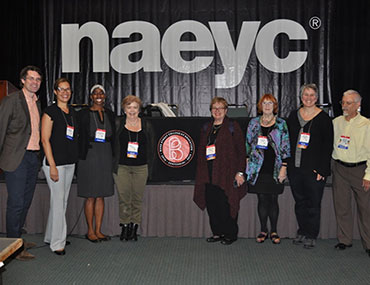Faculty and staff from across Bank Street had the opportunity to showcase their work for thousands of early childhood educators from around the country at this year’s National Association for the Education of Young Children’s (NAEYC) Annual Conference in Los Angeles. The Bank Street community was represented by the Graduate School of Education, School for Children, Bank Street Education Center, and the Development and External Relations Office with four separate events illustrating the breadth of work as well as the power of collaboration across the College.
 In a featured presentation by the Bank Street Education Center, Davia Brown-Franklyn, GSE ’97, Senior Director of Partnerships, and Tarima Levine, GSE ’01, Director of Content Development, described the developmental-interaction approach and shared research demonstrating how emotions drive our thinking and the connection between nonacademic skills and success in school and in life.
In a featured presentation by the Bank Street Education Center, Davia Brown-Franklyn, GSE ’97, Senior Director of Partnerships, and Tarima Levine, GSE ’01, Director of Content Development, described the developmental-interaction approach and shared research demonstrating how emotions drive our thinking and the connection between nonacademic skills and success in school and in life.
Their presentation—Translating social-emotional research into classroom practice: Using what we know to support children’s social-emotional development—was attended by more than 250 teachers, early childhood center directors, community leaders, and parents and stressed the importance of observation in understanding how children develop intellectually.
“We hoped that participants came away from our presentation having a real sense of Bank Street’s developmental-interaction approach and how it can inform all aspects of teaching and learning, including social-emotional development,” Brown-Franklyn said.
Levine agreed, adding, “We wanted participants to experience how the developmental-interaction approach, which includes an integrated curriculum, can deeply engage young children and the adults who teach them in a reciprocal and ongoing process of curiosity, experimentation, and learning.”
In addition, Emily Linsay, GSE ’97, Lower School Coordinator for the School for Children, Wendy Pollock, GSE ’88, Graduate School Advisor/Instructor, and Peggy McNamara, GSE ’78, Chair of the Teaching and Learning Department for the Graduate School, facilitated a presentation—Building Early Childhood Teacher and Leader’s Capacity through Co-Constructing Coaching Relationships—which focused on methods and strategies that can be used in coaching relationships with pre-service teachers, mentor teachers, and leaders.
During the presentation, they demonstrated effective strategies such as case review, non-judgmental note-taking and feedback, and role-play. This was the first time that all three educators worked together and thought about the different ways they engage in coaching.
“The participants appreciated our multiple approaches to coaching and the strategies we presented. We were excited that they were engaged in the role-playing exercise and examination of coaching case studies, which allowed them to think more deeply about the processes involved in coaching and the importance of understanding adult development,” said McNamara.
Ellen Kelley, former Lead Coach for the Building Blocks program, and Brown-Franklyn presented a poster describing the work that Bank Street has been leading collaboratively with the New York City Department of Education. The poster, titled We All Count! Why Building a Community of Learners to Support Pre-K Math Instruction Matters, focused on the development of a framework that supports high-quality, developmentally appropriate practice in pre-K math instruction through the use of curriculum, coaching, and evidence-based professional development models for teachers and leaders. Through this informal sharing opportunity, educators had a chance to get to know Bank Street, ask about how they could do something similar in their schools, or share their own stories.
Douglas Knecht, Executive Director of the Bank Street Education Center, said, “We came away from this year’s conference feeling like a strong Bank Street team united across all the divisions that were represented. It was wonderful to showcase our work and engage in real opportunities for collaboration that benefitted from the different perspectives of our faculty and staff.”
Faculty, staff, and alumni had some downtime at the final Bank Street event—the Alumni Meet-Up. It was a casual gathering of conference participants and Bank Street alums on the evening of November 3rd in the lounge of the JW Marriott, where the conference took place.
Organized by Linda Reing, Director of Alumni Relations and Strategic Events in the Development and External Relations Office, the event provided an opportunity for faculty, staff, and alumni to gather and make or renew connections. She said, “It was a small informal gathering of about a dozen people. Alums had time to have a drink and be together, which is what alumni events should be about.”
Although all four Bank Street events were quite different, each one showcased Bank Street’s commitment to collaboration and meeting others “where they are” to improve teaching and learning for both children and adults. “We had not shared with each other what we were going to say, and even though we don’t work with each other on a daily basis, there was a unifying theme—a belief in our developmental-interaction approach,” Brown-Franklyn said.
NAEYC is a professional membership organization that works to promote high-quality early learning for all young children birth through age 8 by connecting early childhood practice, policy, and research. Its annual conference, which was held this year in Los Angeles on November 2-5, provides a forum for more than 10,000 members to come together to advance a more diverse, dynamic early childhood profession and support all who care for, educate, and work on behalf of young children.